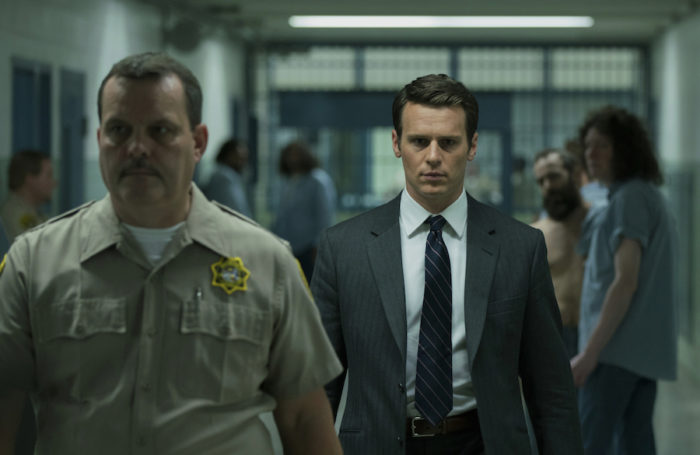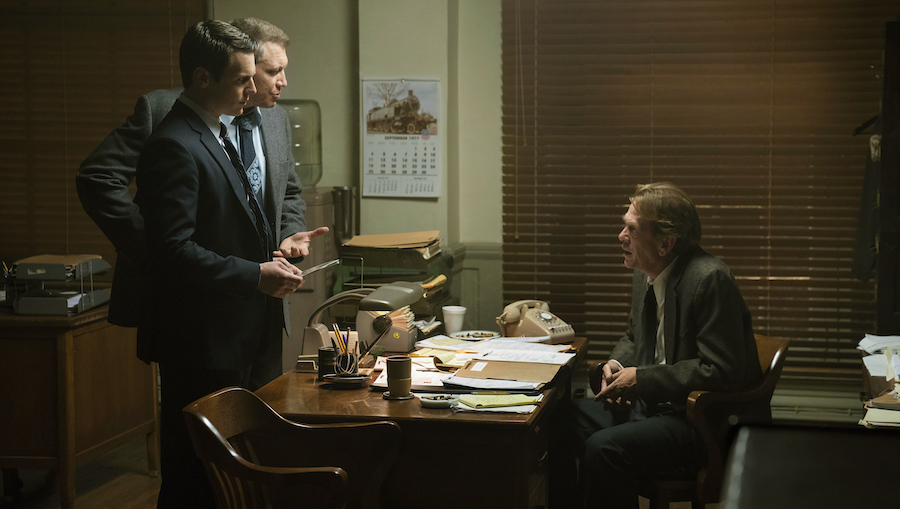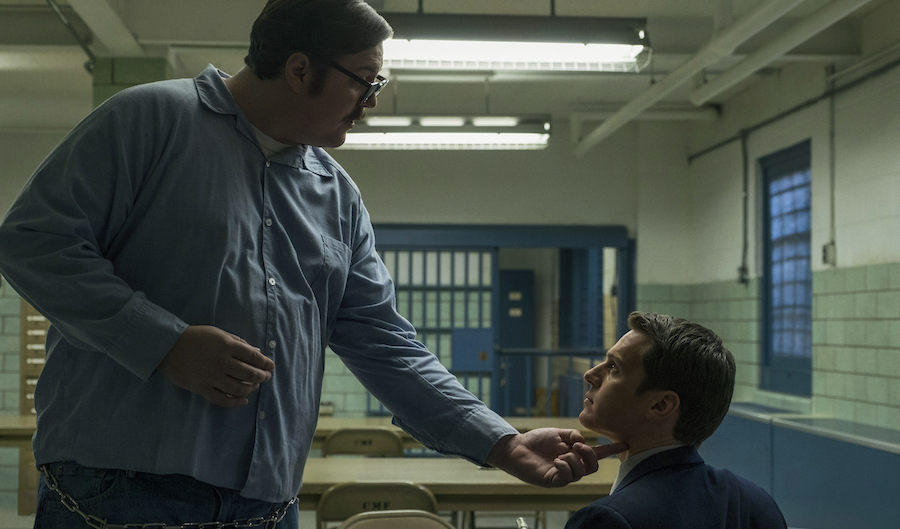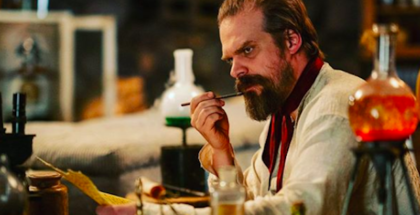Why you should be watching Mindhunter on Netflix
Review Overview
Cast
9Killers
9Conversation
9David Farnor | On 12, Oct 2017
This is a spoiler-free review based on the opening episodes of Mindhunter Season 1.
Nobody ever comes out of a David Fincher film and says they wish it was longer. Not even Zodiac, the two-and-a-half-hour epic crime thriller that doesn’t have a ending. That’s partly because Fincher’s work tends to be long. And it’s partly because he has such a precise, patient measure of pace – perhaps unsurprising for a man famed for meticulously shooting takes over and over again. Mindhunter, his new TV series, sees him in his element: not serial killers, although they’re certainly a preoccupation that dates all the way back to Se7en, but Netflix, where the freedom to drop episodes of any length is a playground for a considered, controlled storyteller.
The show is adapted from the book Mind Hunter: Inside The FBI’s Elite Serial Crime Unit by The Road’s screenwriter, Joe Penhall, and, working with Exec Producers Fincher and Charlize Theron, Penhall has produced something gripping and unique: a crime thriller with barely any crime in it. We open with a messy hostage situation, which sees FBI Agent Holden Ford (Jonathan Groff) try to talk down a man with a shotgun, but after a burst of bloody violence, the show consists almost entirely of very long discussions in closed rooms.
A little more conversation and a little less action might sound dull, but Mindhunter’s success lies in how compelling, complex and creepy those conversations are: it’s a show that has total confidence in the power of speech, knowing that if the characters, topic and words are just right, you can gladly watch two talking heads for hours on end. Two episodes down and Penhall and Fincher aren’t wrong.
The talking heads, of course, are serial killers – except for the fact that, in 1977, serial killers don’t exist yet. “Sequence killers” is the term Holden Ford coins, and only a while after he’s started his project: to interview killers up and down the country to work out what makes them tick. His theory is that doing so will give an insight into the minds of the kind of people the FBI is trying to chase – because the world has changed a lot since the days of John Dillinger, and tracking bad guys is different when the motivations of those bad guys seem entirely beyond reason. It’s a landmark step in the FBI’s approach to crime, a mammoth undertaking that went against senior figures’ wishes as well as the conventional thinking of the time – the book, by Mark Olshaker and John E. Douglas, took years to get off the ground, going on to influence such classics as Silence of the Lambs.
Mindhunter scraps the idea of portraying Olshaker and Douglas as is, a decision that might seem trivial, but gives the show room to breathe: without having to stick to the strict chronology of events and relationships, the dramatised version of history can create the maximum suspense possible, while also exploring the nuances of its lead characters.
“How do we get ahead of crazy if we don’t know how crazy thinks?” sums up Bill Tench (Holt McCallany) in Episode 2, as he and Holden try to explain their methods to some local law enforcement. It takes almost two hours to get to the point where Mindhunter can set out its remit in a concise, catchy soundbite, and that’s precisely why Bill’s character works so well. A veteran of the Bureau, he’s a natural foil for Holden. Where Ford is wet behind the ears and endearingly naive, Bill’s ears have got grey hairs sprouting out of them, and his mouth is as down-to-earth as it gets.
They spark off each other brilliantly. Groff gives his curious greenhorn an awkward edge, which suggests that his enthusiasm to learn more about others is partly based on his own lack of social skills – his interactions with Debbie (Hannah Gross), a smarter, savvier, cooler graduate, are genuinely amusing – while McCallany is charmingly frank, and faintly jaded. Together, they click, Holden reawakening Bill’s interest in his work and Bill keeping Holden in check, and helping to communicate his theories to other people in plain English: it’s not just that they’re a fun, odd-couple double act (a shot of them silently in an elevator together is acutely observed), but that the combination of both personalities is what was required to achieve what they did.
Bill doesn’t appear until halfway through the first episode, and it’s telling that it’s at this point the show really kicks into gear – Ford, until then, feels almost aimless in his general career and directionless conviction. It seems less a case of wobbly writing, and more a case of intentionally letting the characters drive and shape the narrative; in any other series, Mindhunter’s occasionally unsubtle dialogue wouldn’t work at all.
As they tour police stations helping to encourage forces to move away from the ‘who’ and ‘how’ and focus on the ‘why’ of a crime, Holden hits on the idea of stopping off at a nearby facility to talk to Ed Kemper, aka. the “Co-Ed Killer”. He murdered his grandparents, several women and his mother, before having sex with her severed head – and the knowledge that he’s a real person gives every scene he’s in a chilling edge.
“It’s not easy butchering people,” he comments, almost nonchalantly, as he talks to Holden, notepad in hand. Cameron Britton is horribly captivating as Kemper, not only looking like the man but also speaking in a studied way that’s both eloquent and authoritative; it’s easy to see where Thomas Harris’ Hannibal Lecter took his influence from. Groff’s Ford is almost entirely at Kemper’s whim, as their conversations see the power slowly move to the wrong side of the table, and watching that shifting dynamic without Ford being aware of it makes for unsettling, gripping viewing.
Fincher is the ideal pair of hands to ease us into this material, shooting their exchanges with careful, symmetrical frames, slowing moving his camera in closer on his grisly subject. The muted colours and claustrophobic interiors only make the murders being described even more disturbing – the series resists any urge to show us events, because Britton’s delivery is already nasty enough. It’s the audio equivalent of the opening credits, which appear to have been designed by Tyler Durden – a sterile sequence of a tape recover being set up, interrupted by subliminal flashes of gruesome homicides.
The show’s period details are similarly short and brief, easing off any cliches to make sure this all feels more realistic than the fictional versions of similar scenes we’ve seen before. Like Clarice Starling, Ford is brave, clever and out of his depth, but he came before all that. Conversely, the editing, by Fincher regular Kirk Baxter, is top-notch (the montage of our duo travelling between states is gorgeously stylish), but isn’t afraid to wheel out 70s flourishes where needed, with soundtrack choices that would feel overplayed or ironic, if the rest of the series weren’t so clinical and studiously unflashy.
Because the focus, throughout, isn’t on hunting killers: there’s a hint of a possible case-of-the-week structure over the coming episodes, but Mindhunter feels closer to chat-of-the-week; it’s like watching the most unnerving talk show ever. And if the calibre of the conversation can remain this high, the result is set to be endlessly intriguing. Indeed, Netflix couldn’t have picked a better time to bring us Mindhunter. One person questions whether the shift in criminality is a response to the state, which has recently been disrupted by Watergate and Vietnam, and it’s not hard to wonder about possible parallels with the present day. Regardless, we’re a society that is currently obsessed with true crime, all too keen to pick over the macabre facts of actual criminals and unsolved mysteries. As Holden and Bill debate the merits of whether to try and empathise with these twisted killers or not, Mindhunter emerges as a potentially insightful, provocative study of our fascination with true crime. By the time Talking Heads’ Psycho Killer kicks in, you’ll be hooked.
Delivered with a sense of humour that is resolutely dry and steeped in a menacing, noir-tinged atmosphere, Mindhunter is like watching Zodiac, but stretched out for 10 hours. For the first time in Fincher’s career, perhaps, you find yourself wanting it to be longer.
Mindhunter: Season 1 and 2 is available on Netflix UK, as part of an £9.99 monthly subscription.























